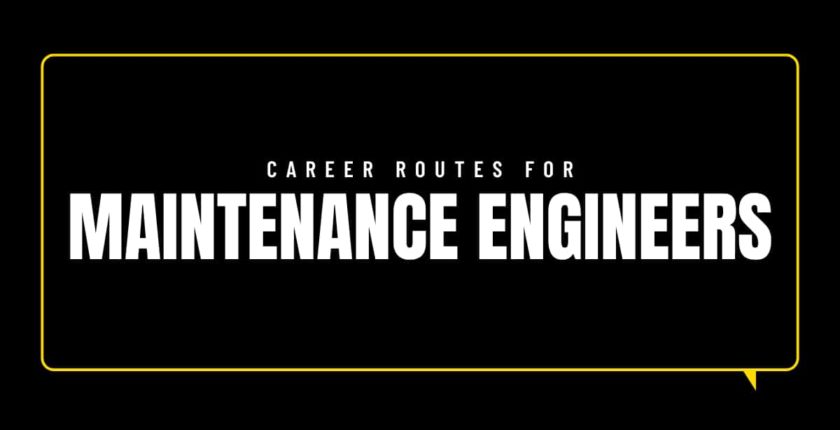What is the Career Route for Maintenance Engineers?
Want to know the typical Maintenance Engineer career? We’ve summarised each level of progression for you to have all the key details in one place.
We cover Maintenance Engineers at these levels:
Newly Qualified Maintenance Engineer
If you’re looking at how to get into the industry, we’re working on that blog now. So, keep your eyes peeled for this.
For now, let’s start off with the first step in your career as a maintenance engineer:
Newly Qualified Maintenance Engineer
After completing your apprenticeship, you’ll find that your responsibilities won’t change too much. You might find that you’ll be working more independently on breakdowns, projects or general Maintenance.
But you’ll still need to work closely with your senior engineers to keep learning, as a 3–5-year course only scratches the surface.
However, your wage should increase dramatically! Which is great after spending that first year on the apprenticeship wage of £6.40)
How much can I earn once I’ve qualified?
It’s difficult to give you a precise figure for this, as everyone is paid differently depending on the company. Our experts have found that the salary can start at £40,000 per annum.

CV Tip
If you’re newly qualified and are looking for your next job, you should download our CV Template created just for you – it’ll make it so much easier to create your CV.
How do you progress to be a Maintenance Engineer?
It doesn’t take you long to get out of that newly-qualified status. Typically, it takes engineers 2-3 years to gain most of the experience they need to work independently.
During this time, you’ll have the option to specialise (or begin to). But we’ll talk more about how to specialist in the moment. First things first, what does the job look like?
What does a Maintenance Engineer do?
As a maintenance engineer, you’ll be working on reactive and preventative maintenance.
Sometimes you can also work on specific projects (like installation). But you’ll spend most of your time responding to breakdowns on site and maintaining the equipment, machinery, systems and infrastructure to keep the site operational.
How much does a Maintenance Engineer earn?
Indeed will tell you that the average engineer will earn £39,998.
Which is low. But that’s because this average also includes Facilities Maintenance engineers. Check out our Maintenance Engineer salary guides to get a more detailed picture of the earning potential of this role. But as a ballpark figure, you can expect anywhere from about £45,000 per annum (without bonuses or overtime).
How do I specialise as a Maintenance Engineer?
As a Maintenance Engineer you can specialise in 3 areas:
Multi-Skilled
Electrical
Mechanical
You’ll find your pay will vary depending on what you specialise in. This is down to the additional qualifications you need to be a Multi-Skilled/Electrical Engineer. So, companies tend to compensate for this.
Most jobs want Multi-Skilled engineers so they can react to more breakdowns on-site. However, some companies do hire single skilled engineers, who work only in their set specialism.
Ultimately, you should focus on what you enjoy and explore that route as a maintenance engineer.
What courses can I do to Upskill or Specialise?
An array of courses are available, but the most sought-after qualification now is any around PLC’s. We see a lot of roles wanting qualified engineers with experience working on PLC’s. So, this is a great one to get under your belt.
The best thing to do if you are looking to upskill or specialise is speak with your employer. Most will be more than happy to support you as you progress. If they’re not, then it might be worth checking our jobs to find a company that will.
How do you Progress to a Senior Engineer?
Getting to this stage is all about experience. You need to expose yourself to multiple breakdowns and know the machinery, systems and infrastructure like the back of your hand.
Getting to this stage is all about experience. You need to expose yourself to multiple breakdowns and know the machinery, systems and infrastructure like the back of your hand.
These are the key bits you need to know about being a Senior Maintenance Engineer.
Years Experience
8-10 years
Avg. Salary
£43,414 (this is on Indeed) But really it should be around £50,000+
Specialism
Any
Some engineers stay as a senior for the entirety of their careers. But, others might want to move into Team Management. We’ll discuss that next.
How to become a Maintenance Team Leader or Engineering Manager?
Once you’ve got a lot of experience under your belt as a Maintenance Engineer, you might want to have more of a say in how the team operates. This is where you can consider managing a team of engineers.
What’s the difference between a Team Leader and a Manager?
Both involve some level of people managing. But here are the key differences of the roles:
Team Leader:
- £45,000 – £55,000
- Focuses on one team and project
- Onboards new members
- Often escalates problematic breakdowns to Engineering Manager
- Retains some level of shop-floor exposure and is 50:50 on the tools
Engineering Manager:
- £55,000 – £60,000+
- Responsible for multiple teams and projects
- Monitors more aspects of the engineering floor running (budgeting/recruitment/operations)
- Has less shop-floor exposure (providing that the company is highly efficient in its operation)
Opportunities as a Maintenance Engineer
Once you’ve got the qualifications needed, your career in maintenance engineering can go anywhere. You can progress from newly-qualified engineer all the way to engineering manager, or stay as a specialist senior engineer. It’s more about what your goals and preferences are.
Most engineers will find that progression comes the longer they stay at a company. As the upper management can see how hard you’ve worked and the value you bring.
But, you can also find new roles to progress (don’t forget to check out ours to see if one matches what you’re looking for).

Next Step
Figure out if your current role is where you want it to be. If it isn’t, speak with your employer about possible progression routes/options. If you can’t be supported, it might be time to look for a new role.
See salary insights for Maintenance Engineers in your area – we have collected data in Warwickshire, West Midlands and the East Midlands.
*Salaries updated April 2024
What Courses can I do to Upskill?
Some courses that are highly valued in the current market are PLC’s. If you manage to gain this qualification, make sure you’re practising it. Too often engineers have this knowledge and fail to give examples of working on them.
But it’s sought after and most sites need at least one engineer with a PLC qualification. The more experienced you are in dealing with it, the likelier you are to be promoted.
Don’t forget to keep in mind that it’s more likely progression will occur when you stay in the same company. If the managers see your hard work and positive attitude, they’ll be more inclined to promote you.
The Experts behind this blog…
The Marketers
Our marketing team have over 9 years experience working in recruitment. Creating content to help candidates, employers and recruiters get results!
The Recruiters
Our recruitment consultants have over 10 years of experience working exclusively in Maintenance Recruitment.
By working in specific locations, our team deliver specialist services tailored to you- none of this generalist stuff that’s all fluff.

